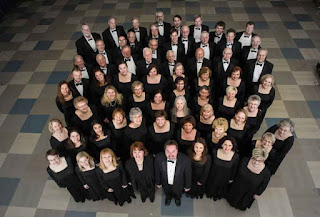A Circuitous Path to Haydn’s Mass in Time of War
 |
| Dr. Britt Cooper |
 |
| Canton Symphony Chorus |
 |
| Soprano Heather Phillips |
 |
| Mezzo-Soprano Sandra Ross |
 |
| Tenor Tim Culver |
 |
| Baritone Michael Roemer |
By Tom Wachunas
It would seem that
the timing of the March 23 MasterWorks
concert from the Canton Symphony Orchestra (CSO) – a few weeks into Lent
- was no accident. If the mission of the
program was to leave the audience awed enough to ponder and savor heavenly
matters, it was ultimately accomplished with glorious panache. But the road to
get there was paved with strange intentions.
The evening began
on a decidedly funereal note with the Leopold Stokowski transcription of Henry
Purcell’s Dido’s Lament. Purcell’s
1688 chamber opera, Dido and Aeneas, was
based on Book IV of Virgil's Aeneid, and
tells of Dido, Queen of Carthage, her love for for the Trojan hero Aeneas, and
her suicidal despair when he abandons her to return to Italy. Dido’s Lament was named for the story’s
final aria, among the most arresting moments in all of opera: “When I am laid
in earth, may my wrongs create no
trouble in thy breast. Remember me but forget my fate.”
Stokowski once
offered this observation to fellow conductors: “We have to try to understand
and give to the listening public what we consider was in the mind of the
composer.” CSO Assistant Conductor
Matthew Jenkins Jaroszewicz clearly took that sage advice to heart. He let Stokowski’s sublime arrangement for
lush-sounding strings do all the singing and directed his attentive ensemble through slowly
unfolding, nuanced layers of the bittersweet melody, beautifully augmented by
poignant soloing from principal cellist, Brian Klickman.
One might
reasonably hope that after experiencing the searing emotionality of the lament,
the next program selection would offer something less morose, more uplifting,
or at least gracefully optimistic. Instead, Igor Stravinsky’s suite of eight
pieces from his music for the ballet, Pulcinella,
was an oddly frenetic interlude in this context. After drinking so deeply of
Dido’s pathos, Pulcinella, even in
its most pleasant moments, had all the grace of a hiccup. The fault, if it
could be called one, was neither in the orchestra’s adventurous performance nor
in the brisk conducting by Jaroszewicz.
In 1920, Stravinsky
was so impassioned by his study of the charming simplicity he encountered in
assorted choral and instrumental scores by 18th-century Italian composer
Giovanni Pergolesi (and a handful of other forgotten composers) that he
re-worked them for his ballet score. If the music sounds like a somewhat scatterbrained exercise in thematic
meandering, it’s only because it reflects the dual nature of Pulcinella
himself. He was a comic hero who became a stock character in 17th century
Neapolitan commedia dell’arte
productions. Depending on a given scenario, he could be a crass, silly bumpkin,
or a proud, witty thief, and often both.
As it was, the
orchestra pranced through all the suite’s spasmodic twists of harmonies,
textures, and rhythms in a spirit of giddy abandon. Fortunately, the
intermission afforded enough distance from such worldly wanderings so we could
more calmly prepare for passage into loftier realms. After all, we were about
to be taken to church.
Responding to a
complaint that the ending of one of his Masses was too frolicsome, Franz Joseph
Haydn said, “I cannot write them otherwise. When I think of God, my heart is so
full of joy that the notes gush forth as from a fountain. Since God has given
me a joyful heart, He will forgive me for having served Him joyfully.” Haydn
composed Missa in Tempore Belli (Mass in
Time of War) in the autumn of 1796, a notably unjoyful time. France and
Austria were at war, and Napolean’s army was advancing toward Vienna.
Under the
commanding baton of Dr. Britt Cooper, Director of the Canton Symphony Chorus,
singers and orchestra delivered a reverent, brilliantly paced account of this
dramatic work that was wholly magnificent. Cooper’s meticulous sensitivity to
the ebb and flow of expressive aural dynamics in the work – when to be loud,
when to be soft - was impeccable. The
vocal quartet – featuring the crystalline luster of soprano Heather Phillips,
the steady warmth of mezzo-soprano Sandra Ross, the radiance of tenor Tim
Culver, and the robust sonority of baritone Michael Roemer - was spellbinding.
Additionally, the large chorus was itself an auditory phenomenon of astonishing
clarity and power, and always in perfect balance with the orchestra.
While Haydn effectively
implied some of the wartime angst of his day in the final part of this Mass,
the Agnus Dei (Lamb of God), the
stunning music eventually soars above the morbid. Yes, it began with the chorus
voicing an urgent, somber plea for mercy amid the encroaching sounds of timpani
sounding out an ominous march. But bright trumpet fanfares signal hope, and the
chorus begins to voice divine assurance in a dance-like rhythm, repeating dona nobis pacem. Grant us peace. Haydn’s
notes, gushing forth as from a fountain. In the end, not only God, but we too,
had been served joyfully.

No comments:
Post a Comment